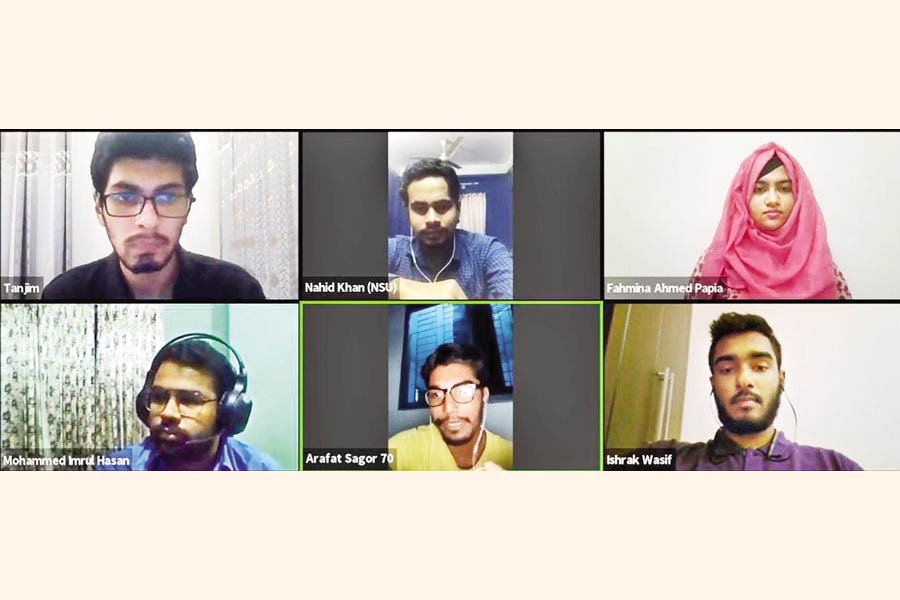
Tomorrow’s leaders focus on e-learning
Shafa Tasneem | Thursday, 19 November 2020

Digital divide between the urban and rural areas has been the biggest barrier in the post pandemic e-learning process. As the education sector is getting seemingly dependent on e-learning, problems with strong network and fluid internet connection are becoming more visible. Echo, an online platform by The Financial Express arranged a discussion on these problems where students from different universities joined as discussants. This programme 'Youth Echo: Episode 1' focused on the topic, "Efficacy of E-learning during the Pandemic" where the students expressed their concern on various problems regarding the issue.
In this first episode, students from both public and private universities joined the session. Tanjim-Ul Islam, a student from Department of Economics, Dhaka University led the discussion. The participants were Fahmina Ahmed Papia and Shafa Tasneem Dhaka University, Tanjim Hasan Patwary and Imrul Hasan from Chittagong University, Ishrak Wasif and Wasik Billah Ibn Rashid from Islamic University of Technology, Arafat Sagor from Noakhali Science and Technology University, and Nahid Khan from North South University. They shared their experiences of coping with the newly adapted e-learning process,expectations and effectiveness of it.
Covid-19 pandemic hit the country at the beginning of this year. On March 16, the Bangladesh government shut down all educational institutions to prevent infection. Recently, the closure has been extended till 19 December. Hence, uncertainty of reopening educational institutions is growing day by day. Most educational institutions have taken up e-learning as the alternative already. And a mixed reaction persists among students regarding online classes. Students who are less privileged are finding it difficult to continue regular online classes. Their internet connection gets disrupted several times in between the classes. Many have problems regarding the cost of internet. However, to some, it has been a good journey as well, as online classes save up a big portion of their commute time.
Most of the students in rural areas have to use mobile data to join classes. These data packages are quite costly and do not assure a stable connection. Few universities, though, have signed agreements with the mobile operators for budget friendly or free internet packages. But, those data packages have very low bandwidth and have a very unstable connection too. So, online classes are not turning out to be effective for many of them.
Another reason for online classes to be not effective, according to the discussants, is distraction during the class. In the classroom, students get a suitable environment for studying which does not happen at home. Again, theoretical classes can be conducted online somehow, but the technical lab classes are being postponed. Students from the technical backgrounds have been suffering the most. Besides, a tendency of free-riding in a group project has increased as many of the members do not have easy access to computers or internet.
About the examinations, public universities are not going through any evaluation process at the moment. As a result, it has become quite impossible to avoid the session jam. Hence, the public university students expressed their frustration about delayed completion of education and entering the job market. Although private universities are taking online exams, it has been tough for students to cope with the process. Some of the discussants also said that they are experiencing back pain, eye problems, etc. sitting in front of the computer all day long.
Eventually the participants discussed the problems faced by the teachers as well during online classes. They reached the conclusion that, primarily, teachers need to be equipped with necessary instruments and trained on how to take online classes efficiently. Also, they believe that a budget friendly and efficient online platform can be developed nationally for all educational institutions to conduct online classes. They also recommended a change in the evaluation process suggesting that evaluation should be based on critical thinking, rather than mere theoretical aspects. Nevertheless, the maximum efficacy of e-learning could only be achieved when the digital divide could be brought near to zero.
The writer is a student of economics at University of Dhaka. She can be reached at [email protected]